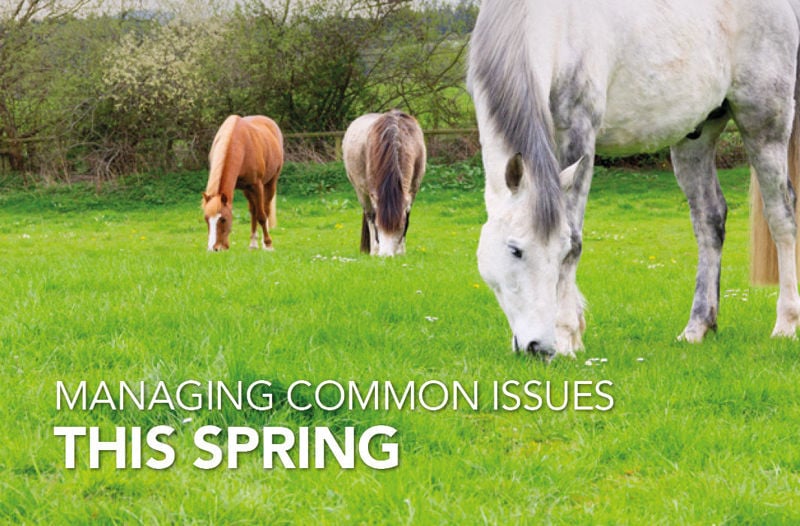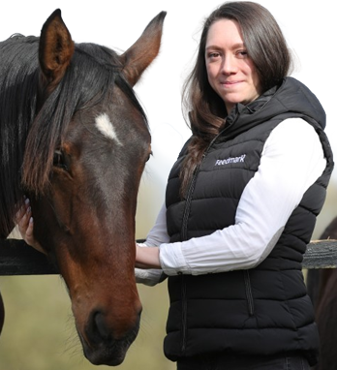With spring finally here, horse owners can now begin to tackle the challenges that the warmer weather and increased grass growth brings. Our nutritionist explains how to help your horse overcome common spring conditions
Supporting Digestion
For horses who have spent time being stabled over the winter months, spring means more time out in the paddock. This will be a change to the horse’s forage intake, moving from dry forage in the form of hay or haylage to an increase in fresh grass, which can cause havoc with the digestive system.
Spring grass is high in sugar, and this can lead to rapid fermentation of fibre in the hindgut. This changes the microbial balance which can lead to an increase in gas producing microbes and extremely gassy horses. As spring grass is high in water there is generally a good flow of digesta through the gut which means that this gas should be expelled easily.
Visual changes to manure are common when spring grazing is introduced into the diet. Droppings usually take on a green cowpat appearance which is due to the elevated water content of the grass. This should reside quickly, however a dramatic shift in the hindgut microbiome, which can be caused by suddenly changing the diet (introducing spring grazing) does make the hindgut more susceptible to the effects of pathogenic bacteria which are normally found in the hindgut in small numbers, but will take advantage when dysbiosis occurs.
Horses prone to colic must be monitored closely when introduced to spring grazing. Hay and mature grass have a much higher fibre content than fresh spring grass. The risk of colic in prone horses increases greatly when fed fresh grass as the lower fibre content of the grazing changes the gastrointestinal environment. Offering hay during the transition to new spring grazing can help to reduce changes occurring in the gastrointestinal environment.
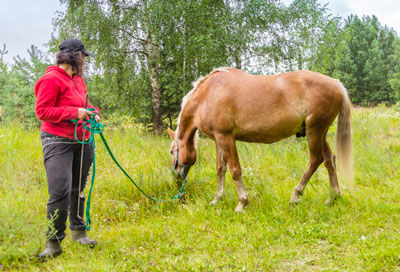
Hand grazing for a few minutes each dayis one way you can help the gut microbes to adapt
So, how can we support our horse's digestion during this time? Hand grazing for a few minutes each day or feeding some dried grass chaff or pellets and continuing to provide some hay will help the gut microbes to adapt, ensuring that they are ready for consuming a grass-based diet. Not only is this good for your horse but it also helps to avoid the green, sloppy cow pats that come along with the introduction of spring grazing!
Laminitis management
Fresh spring grass is a worry for horse owners managing laminitis prone equines. Although there are several modes of action which may cause laminitis, one chain of events involves the hindgut. When large quantities of spring grass are consumed, some of the sugar in the grass can bypass digestion in the small intestine and reach the hindgut. When sugar reaches the hindgut, it is fermented, and consequently causes a drop in the hindgut pH. This sets off a chain reaction which ultimately leads to changes in the lamellar region of the hoof, causing laminitis.
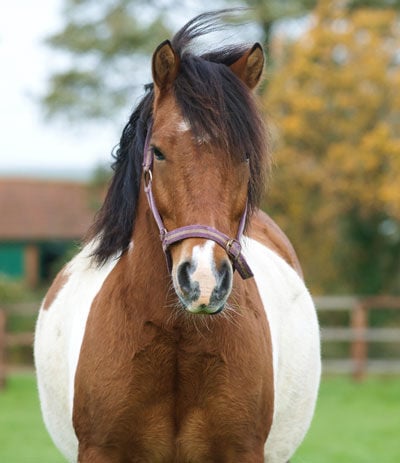
Spring grass is a worry for horse owners managing laminitis prone equines
High sugar grass is also a risk for horses with insulin dysregulation as consumption causes a rise in blood glucose, triggering the release of insulin. When a horse or pony is insulin resistant the mechanisms of reducing circulating blood glucose levels malfunctions, leading to high levels of insulin in the bloodstream.
You can read more about Laminitis here>
Managing weight gain / Balancing the diet
Horses and ponies usually consume 1.5 – 2% of their bodyweight in forage and this is enough to maintain bodyweight. When the spring grass starts to come through, consumption rates can rise to 3 – 5% so it is no wonder that horses pile on the pounds when given access to spring grazing.
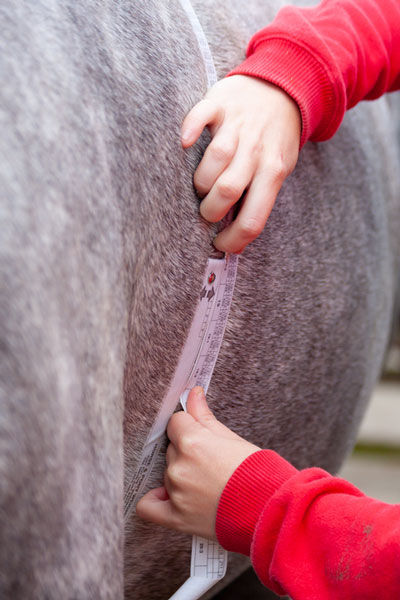
Monitor your horse's weight using a weigh tape
Grass turnout allows horses to demonstrate natural behaviours, such as trickle feeding and can provide an opportunity for social interaction. But many horse owners don’t consider the nutrient content of the grass their horses are eating. Although lush spring grass looks far more nutritious when compared to conserved forage, grass rarely supplies the horse with a fully balanced diet of vitamins and minerals. Fresh grass will provide vitamins such as vitamin E but it won’t provide everything your horse needs.
Fresh growing grass is much higher in energy (calories) when compared to hay or haylage on a dry matter basis. The energy content of grass is variable depending on time of year, weather conditions, location, and management. Meadow pasture has an approximate Digestible Energy (DE) content of 8-10 Mj/kg on a dry matter (DM) basis. However, some grasses at certain times of year can provide up to 14 Mj/kg DM.
When managing good doers on spring grazing or restricted forage intakes, it is important to ensure a balanced diet is still being provided, even if their rations need to be reduced to help manage their weight. This is also true for horses on reduce concentrate rations as they will be missing out on important vitamins and minerals.
Behaviour
We’ve all heard the term ‘the joys of spring’ which certainly does apply to some horses during this time of year, causing them to be challenging to handle and ride. The higher level of energy in the grass, combined with additional turnout can be all too much for some horses and many owners turn towards calmers to help get through this tricky time.
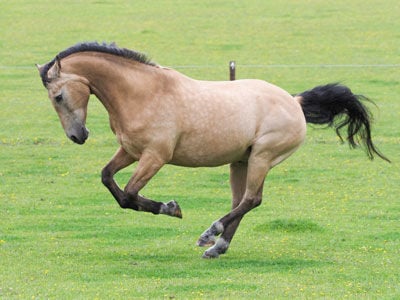
Additional turnout and higher energy in grass can affect your horse's behaviour
Magnesium is typically low in spring grazing and the higher levels of potassium in grass further limit the uptake of this mineral. It is well known that magnesium plays a key role in behaviour and the low levels from spring grazing combined with much higher energy levels in the grass can lead to excitable behaviours.
It is well documented that diet influences the population of hindgut microbes and that the gut has a link to the brain. In other species, it has been seen that gut disturbances have led to changes in behaviour due to the composition of the gut microflora.
When choosing a supplement to support your horse’s behaviour, look for ingredients such as Magnesium which has been shown to promote a calm and trainable temperament and additional ingredients such as herbs like Chamomile and Lemon balm, which have soothing effects, can be beneficial, along with B vitamins which have a positive effect on nervous function.
If your horse gets excitable or tends to be nervous, using a calmer can help to support a more desirable temperament and encourage focus.
Allergies
At this time of year, when pollen counts are high, some horses can suffer from allergies. Seasonal allergies in horses present as a runny nose and watery eyes and can sometimes be attributed to headshaking. Hives, large, raised welts on the body, are also associated with seasonal allergies due to something the horse inhales.
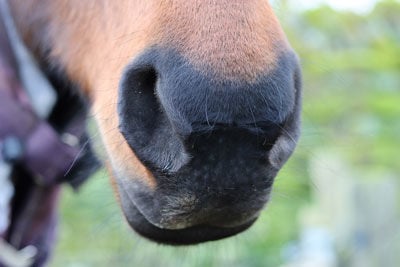
Long hairs in the horse’s nasal cavity act as a filtration system, trapping particles of dust and pollen that enter the airways. When there is an abundance of pollen in the spring, there can be a build-up which triggers a reaction in susceptible horses.
Pollen and dust in the horse’s environment can trigger an inflammatory response where the mucus membranes of the eyes and nose are inflamed. This inflammation is the result of blood vessels dilating and causes the symptoms that we see.
Common symptoms include:
· Coughing
· Watery eyes
· Head shaking
· Lethargy / Poor performance
For any advice or questions you may have, please don't hestiate to reach out to our expert nutrition team. You can call 0800 585525 Monday-Friday 8:30am-5:00pm. Email [email protected], or send us a DM on social media.


